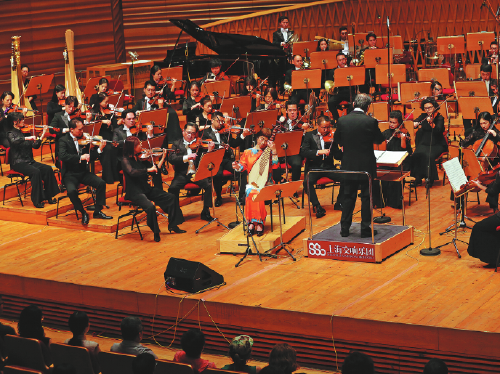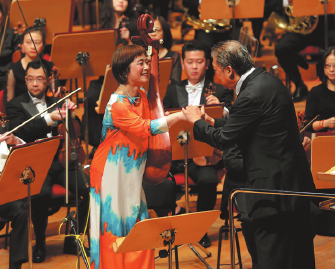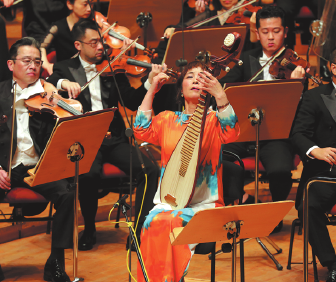
Pipa virtuoso Wu Man, the first artist in residence to play a traditional Chinese instrument in the Shanghai Symphony Orchestra, performs during the company's 2025/26 season's opening concert, conducted by music director Yu Long, on Sept 5.

Pipa musician Wu Man interacts with conductor Yu Long during the opening concert of the Shanghai Symphony Orchestra's 2025/26 season.

Wu played composer Zhao Jiping's Pipa Concerto No 2 during the event.
The Shanghai Symphony Orchestra opened its 2025/26 season on Sept 5 with a performance by its new artist in residence, Wu Man, of Pipa Concerto No 2 by Chinese composer Zhao Jiping.
Widely recognized as the world's premier pipa (a four-stringed Chinese lute) virtuoso, Chinese American musician Wu is one of the first Chinese folk music instrumentalists invited by the orchestra to serve as artist in residence. The decision was "a tribute to her artistic accomplishments and her achievements in promoting Chinese music worldwide, as well as an expression of the Shanghai Symphony Orchestra's attitude toward inheriting and promoting Chinese culture", says Yu Long, music director of the orchestra and conductor of the concert.
Wu played Zhao's Pipa Concerto No 2, a piece tailor-made for her, which also illustrates Zhao's personal style as an international award-winning composer best known for his music in the movies Red Sorghum and Farewell My Concubine.
The concerto adopts the tones of Suzhou pingtan, a traditional form of storytelling and ballad singing, and features beautiful melodies and adept use of the pipa. "I used to play the piece overseas, and audiences immediately liked it," she says.
Later in the new season, Wu will play two concertos with the orchestra that were also tailor-made for her. On May 22, 2026, she will play Lou Harrison's Concerto for Pipa with String Orchestra under the baton of Jing Huan. This piece helped Wu win a nomination for Best Instrumental Soloist at the 51st Grammy Awards in 2009.
On June 5, she will collaborate with British conductor Jonathan Nott to present the Chinese premiere of Du Yun's composition Ears of the Book. Du was the first Chinese musician to win the Pulitzer Prize for music in 2017. The piece was created while Du "was literally imagining how Wu Man is going to sit on the stage", according to a 2024 interview with the composer by Lana Norris, a conductor, pianist, and educator based in New York City. "I'm looking at who she is and her energy," says Du.
The pipa is a lutelike plucked-string instrument with four strings. It originated in West Asia and was introduced to China in the second century. It has since developed into a prominent instrument in Chinese opera orchestras and solo performances.
The traditional Chinese instrument belongs to a family of plucked string instruments worldwide, Wu says. "It has the vocabulary of Chinese music, such as pingtan, a representative of Jiangnan culture, but back in the Tang Dynasty (618-907), it probably spoke a different Central Asian language. … It is through constant communications and exchanges that the pipa evolved to the way it is now."
A Chinese instrument such as the pipa collaborating with Western instruments, and with the Shanghai orchestra, makes "one of the best symphonies in the world", Wu says. "I think the key challenge is to find balance in the sound. We are still in the process of harmonizing. … It may take several generations of composers and performers to perfect it."
Wu was born in Hangzhou, East China's Zhejiang province, in 1963 and studied at the Central Conservatory of Music in Beijing. She was the first pipa player to receive a master's degree from the school in 1987. She moved to the United States in 1990 and has since embarked on a performance career collaborating with musicians from around the world.
In the past decades, she has recorded and appeared on more than 40 albums, five of which have been nominated for Grammy Awards.
The pipa has become widely known and accepted by the global music scene, with new compositions created specifically for the instrument, Wu found, "and I have made my contribution", she says, beaming. "People may see my accomplishments now, but they don't realize I have quietly worked hard for 30 years."
She suggests that young musicians aspiring for an international career should "embrace different musical elements and cultures with an open heart".
Before her recitals abroad, Wu would often visit local universities, high schools, and primary schools to talk about Chinese music and traditional instruments. "Many people knew nothing about the pipa before stepping into the concert hall," she says. "They would look for familiar sounds. Some would say it sounds like a guitar, an oud, a banjo, or a harp. … And they would go home with smiles on their faces."
Contact the writer at zhangkun@chinadaily.com.cn

